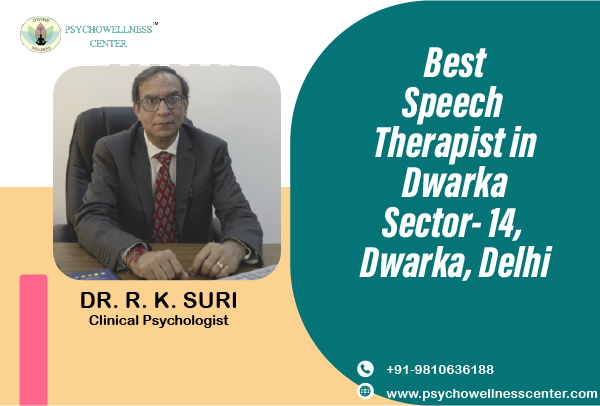Best Speech Therapist in Dwarka Sector- 14, Dwarka, Delhi

Communication is a cornerstone of human interaction, and its effectiveness largely depends on social communication skills and the ability to use language appropriately in social contexts. These skills enable us to understand and respond to social cues, engage in meaningful conversations, and build lasting relationships. However, for some individuals, these abilities may not develop naturally, requiring support through interventions such as speech therapy. Speech therapy is a powerful tool that helps individuals of all ages improve their social communication skills, ensuring they can navigate the complexities of social interactions confidently.
What Are Social Communication Skills?
Social communication skills encompass the verbal and nonverbal abilities needed to interact effectively with others. These include:
Pragmatics: Knowing how to use language in social settings, including tone, volume, and appropriateness of speech.
Nonverbal Communication: Understanding and using gestures, facial expressions, and body language.
Conversation Skills: Engaging in turn-taking, staying on topic, and understanding when to start or stop speaking.
Understanding Social Cues: Picking up on subtle hints in conversations, such as sarcasm or emotional undertones.
When these skills are underdeveloped, individuals may struggle to connect with others, leading to isolation and frustration.
The Role of Speech Therapy in Developing Social Communication Skills
Speech therapy focuses on identifying and addressing deficits in social communication. A speech therapist assesses an individual’s communication abilities and designs a personalized intervention plan to target specific challenges.
Key Strategies in Speech Therapy
Teaching Pragmatics: Therapists teach individuals how to use language appropriately based on context, such as adjusting tone and volume for different settings.
Role-Playing Activities: Simulated scenarios, such as ordering at a restaurant or making small talk, help individuals practice real-life interactions.
Nonverbal Communication Training: Speech therapy emphasizes understanding and using gestures, facial expressions, and body language effectively.
Improving Listening Skills: Therapists work on active listening, which is essential for understanding and responding appropriately in conversations.
Building Emotional Understanding: Recognizing and interpreting emotions in oneself and others is an important aspect of social communication.
Through consistent practice and guidance, individuals can enhance their ability to connect with others, improving their quality of life.
How Speech Therapy Supports Different Age Groups
Children
For children, early intervention is important. Many children with developmental delays, autism spectrum disorder (ASD), or speech-language disorders face challenges in social communication. Speech therapists use play-based techniques and engaging activities to teach children how to interact with peers, express their needs, and understand social norms.
Teenagers
Adolescents often face unique social pressures. Speech therapy helps them navigate these challenges by teaching conversational etiquette, peer interaction skills, and ways to manage social anxiety. Role-playing and group therapy sessions are particularly effective for this age group.
Adults
Adults may require speech therapy for social communication skills due to conditions such as traumatic brain injuries, strokes, or neurodegenerative diseases. Therapy focuses on regaining lost skills or adapting to new communication challenges.
Psychowellness Center and its Experts
Psychowellness Center is a leading mental health and wellness clinic dedicated to providing holistic care to individuals of all ages. Located in Dwarka, Delhi, the center offers a wide range of services, including speech therapy, psychological counseling, and mental health assessments.
With a team of experienced professionals, Psychowellness Center is committed to addressing the unique needs of every client. Whether it’s helping children develop social communication skills or supporting adults in rebuilding their confidence, the center employs evidence-based practices to achieve meaningful results.
Dr. R. K. Suri is a renowned clinical psychologist and the founder of Psychowellness Center. With decades of experience, Dr. Suri specialises in cognitive-behavioral therapy (CBT), neuropsychology, and developmental psychology. His expertise in guiding individuals toward emotional well-being has earned him a stellar reputation in the mental health community.
Dr. Alam is a speech therapist with extensive experience in developmental and behavioral therapy. He is skilled in addressing speech delay challenges in children, helping them build confidence and connect with their peers.
Why Choose Speech Therapy at Psychowellness Center?
Psychowellness Center stands out for its comprehensive and multidisciplinary approach to mental health and communication disorders. The therapists collaborate to ensure that clients receive holistic care, addressing both emotional and communication challenges.
Key features include:
Personalised therapy plans tailored to individual needs.
A supportive and inclusive environment for clients and their families.
Regular progress assessments to ensure measurable improvements.
Access to a team of experts with diverse specialties.
How Speech Therapy Transforms Lives
Speech therapy not only improves social communication skills but also enhances self-esteem and emotional well-being. Here’s how:
Boosts Confidence: By mastering social communication, individuals feel more confident in social settings.
Strengthens Relationships: Improved communication skills lead to stronger bonds with family, friends, and colleagues.
Enhances Academic and Professional Success: Effective communication is essential for success in school and the workplace.
Promotes Emotional Well-Being: The ability to express oneself and connect with others reduces feelings of isolation and frustration.
Conclusion
Social communication skills are vital for personal and professional success, and speech therapy offers a proven path to developing these abilities. With the right guidance and support, individuals can overcome communication barriers and build fulfilling relationships.
At Psychowellness Center, experts like best psychologists are dedicated to helping clients achieve their goals. Their compassionate and evidence-based approach ensures that every individual receives the care they need to thrive.
Contributed by Ms. Sakshi Dhankhar, Counselling Psychologist
References
American Speech-Language-Hearing Association. (n.d.). Social Communication Disorders. Retrieved from www.asha.org
National Institute on Deafness and Other Communication Disorders. (2023). Speech and Language Development.
Psychowellness Center. (n.d.). Services and Therapies. Retrieved from www.psychowellnesscenter.com




SHARE